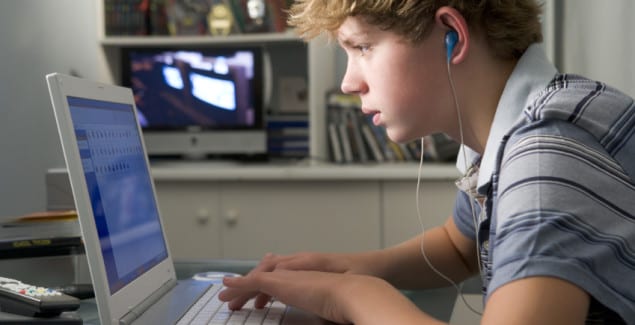How To Talk To Your Kids About Internet Pornography

Posted in: Grade School, Hot Topics, Teenagers
Topics: Child + Adolescent Development, Digital Media, Hot Topics
When I was in medical school, there was this show called Beavis and Butthead.
Beavis and Butthead (as their names suggest) were two exaggerated versions of typical early adolescent boys who snickered at words with even a hint of sexual connotation. It was fashionable when the show was on to imitate their raspy laughter. I’ll admit that many of my friends (men and women alike) found the show to be pretty funny. Its creator, Mike Judge, has gone on to do some great comedy on the big screen.
So, what do Beavis and Butthead have to do with internet pornography?
Not much—and that’s a good place to start this discussion.
Many of the more memorable episodes of Beavis and Butthead would not have been possible in the age of X-rated cyberspace. In one episode, the boys sneak into a coveted nudist colony because they lack the $4,000 entrance fee. They just want to watch. They’re curious.
But this episode was written at a time when there was no internet to speak of. The access to pornographic images for Beavis and Butthead was relegated to magazines with the front covers shielded, kept safely behind the counter at 7-Elevens and gas stations. (Or, more exotically, at nudist colonies.)
Today, the nudist colony episode would last about four minutes. There’s no longer a need to sneak into a nudist colony—you just have to search your computer.
Discussing the multitude of sexually provocative images and movies that are readily available on the internet is, to say the least, difficult. Nevertheless, I’d estimate that not a week goes by that I don’t hear about someone who is understandably worried about his or her child’s interest in, or apparent exploration of, internet pornography. This has become a central issue in child development.
This post will not attempt to define pornography (indeed, the famous U.S. Supreme Court default of “I know it when I see it” shows how hard it is to put these issues into words), nor will it shower you with endless statistics. Estimates of the amount of pornography online are almost certainly overblown–but this isn’t the place to quibble about numbers. What we know, from studies as well as from clinical experience, is this:
- A huge percentage of both boys and girls are very interested in this particular internet content.
- A smaller percentage of these boys and girls become increasingly unable to think of much else as a result of this content.
- And, finally, an unknown percentage of these boys and girls start to believe that what they see online is representative of normative sexual behavior.
It’s this last conclusion—that internet pornography might drive expectations around sexual experience—that is most worrisome.
Remember that humans are sexual creatures; we are programmed to think and behave sexually. It is also the case that sexual experimentation and activity are healthy and normal parts of human development. Kids at all ages have a sexual drive and curiosity—from “playing doctor,” to wanting to come into the bathroom with Mommy or Daddy. Teenagers, with their stronger sexual urges, will of course want to explore sexuality in far more advanced ways. It’s simply part of being human.
How to Talk With Kids About Pornography
So, how do we reconcile our normal and healthy drives with the massive amount of sexually provocative material that is amply available online? More importantly, how do we discuss these issues with our kids?
Here are some tips to follow. But first, as you read this advice, remember that each child is different. You’ll need to adjust your tone and your attitude based on your child’s developmental stage and your own personal belief system.
Here’s what we can offer:
1. Regardless of your approach, leave shame out of the discussion. Mixing shame with sexual curiosity is almost always a ticket to unwanted results. If your child feels ashamed of his or her own curiosity and drives, then you are very unlikely to hear from your child when there’s real trouble.
2. If you are comfortable with the discussion, approach the issue before it’s an issue. Keep the computer in a public area when your children are younger, and let them know that there is content online that you’d rather they not see. There are internet blocking programs (so-called parental controls), and while many of these work moderately well at keeping the internet kid-friendly, no system is full-proof. That means that in very concrete terms, you should tell your child something like this: “If you come upon a site that feels inappropriate, please tell me.” For most kids, that’s enough. They know what inappropriate means, and they’ll still want access to their online games. There’s certainly a lot of worthwhile stuff on the computer, so telling your kids to let you know if they stumble onto something that doesn’t feel right usually does the trick.
3. If your child does find his or her way into some tawdry material, talk about it. Say something like this: “That material is designed for adults and not for children. I’m sorry that it showed up on the computer, and we’ll work to block that and other sites like it. Do you have any questions?” You can take it from there. Remember that it’s always OK with younger kids to say that this is something you’ll discuss more with them when they’re older.
4. For older kids who might have computers, smartphones, or tablets in their rooms, you can only do so much. If you notice the cardinal signs of unhealthy internet use—skipping meals, staying up late, locking the door and offering obfuscated explanations for online behavior—you ought to talk. You especially ought to talk if you find evidence (such as a search history) that your child has visited pornographic sites. Again, this discussion should happen without shame. Say something like: “I’ve noticed that you’ve been spending a lot of private time on the internet, and it looks like from the history that you’ve visited some adult sites. I want to make sure you understand some important aspects of these sites, and the risks associated with this material.” You should then go on to stress that the computer itself becomes tagged in the cyber world once pornographic sites have been visited. Servers become “aware” of where a computer has been. That can lead to unwanted, even dangerous, attention paid to those who use that computer.
Most importantly, let your children know that what they see online is NOT REAL. Sexual activity is normal, but what they’re seeing is staged. It’s like reality TV; no one really believes that reality TV isn’t to some extent scripted. Similarly, even the adult internet sites with “regular people” are, by definition, not depicting regular sexual activity. That’s because they’re performing on-camera, or worse, because they’re being unknowingly filmed. This is in many cases exploitative, and you can stress to your teen that sexual activity never goes well when one person exploits another.
You can then decide with your teen how much you want to limit access to the computer. You should also discuss the strong feelings that are generated with any sexual activity. One of the reasons we ask adolescents to think so carefully about sexual conduct is that the conduct itself often stirs up unexpected and sometimes overwhelming emotional reactions. To that end, we’d like our children to have realistic views of what constitutes healthy sexual behavior.
5. This brings up the issue of prohibition. In general, outright prohibition doesn’t work. It didn’t work with alcohol for the general public in the 1930s, and it didn’t work with the efforts to curb music purchases in the 1980s. With adolescents, prohibition actually tends to promote greater temptation. This is not to say that we as parents don’t have rules. We just need to elaborate on why we don’t want pornography to be viewed by our teens, and engage in open discussion.
6. It’s very likely your adolescent won’t want to have an in-depth talk with you. That’s fine. He or she will still mull over what you say. If you feel your teen needs to have a more in-depth conversation and won’t have it with you, enlist other professionals, older siblings, trusted relatives, or advisors. School guidance counselors, pediatricians, religious leaders and even Boys & Girls Club leaders can be very helpful in these circumstances. If there is concern about addictive behavior, be wary of “internet addiction experts.” There are, without a doubt, experts in this burgeoning field, but there are no standards by which someone might claim expertise. Make sure that you vet anyone whom you trust to have such sensitive discussions with your children.
Sex is, of course, a normal part of being human. If we keep this in mind, then we can take what we see on the internet with a grain of salt. What we call pornographic images stretch back to antiquity; the difference today is largely one of scope. The vastness of what is available to view, the ease of accessibility with which it can be viewed and the unknown effects of such far-reaching access are largely unknown. We’ll surely have better guidelines in a few years, but for now, as we always stress, talk to your child. It will be a welcomed discussion—even if takes him or her a few years to realize it.
And be prepared to blush during that discussion. That’s also part of being human.

 Share
Share Tweet
Tweet





